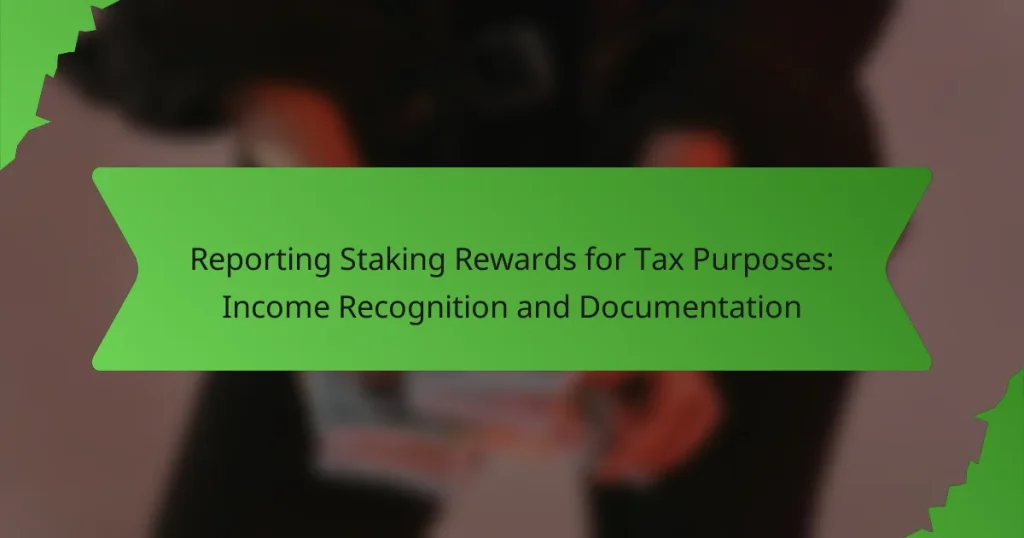Staking rewards are incentives provided to cryptocurrency holders for participating in the staking process, typically paid in additional cryptocurrency tokens. These rewards are classified as taxable income by the IRS, requiring individuals to report their fair market value upon receipt. Accurate documentation of staking activities is crucial for compliance with tax regulations, including the tracking of dates, amounts, and fair market values. Challenges in reporting these rewards arise from fluctuating cryptocurrency prices, difficulties in record-keeping, and varying tax regulations across jurisdictions. Understanding the implications and requirements for reporting staking rewards is essential for effective tax compliance.

What are Staking Rewards and Why Do They Matter for Tax Purposes?
Staking rewards are incentives given to cryptocurrency holders for participating in the staking process. These rewards are typically paid in the form of additional cryptocurrency tokens. Staking involves locking up a certain amount of cryptocurrency to support network operations, such as transaction validation.
For tax purposes, staking rewards are considered taxable income. This means individuals must report the fair market value of the rewards at the time they are received. The IRS treats these rewards as ordinary income, which can affect an individual’s overall tax liability. Accurate documentation of staking activities is essential for compliance with tax regulations.
How are Staking Rewards defined in the context of taxation?
Staking rewards are defined as income for tax purposes. When individuals earn staking rewards, these rewards are typically considered taxable income at the fair market value on the date they are received. This classification aligns with guidance from tax authorities, such as the IRS in the United States. Specifically, the IRS states that virtual currency received as income must be reported as ordinary income. Therefore, individuals must keep accurate records of the fair market value at the time of receipt for proper reporting. This ensures compliance with tax regulations and accurate income reporting.
What attributes characterize Staking Rewards?
Staking rewards are characterized by several key attributes. They represent income generated from participating in a proof-of-stake blockchain network. The rewards are typically distributed in the form of additional cryptocurrency tokens. The amount of rewards earned can vary based on the total stake and the network’s reward distribution mechanism. Staking rewards can also be subject to taxation as income in many jurisdictions. This means they must be reported for tax purposes. Additionally, the frequency of reward distribution can differ between networks, affecting the timing of income recognition. Overall, these attributes define how staking rewards function and their implications for tax reporting.
Why is it important to recognize Staking Rewards as income?
Recognizing Staking Rewards as income is crucial for accurate tax reporting. Staking rewards are considered taxable income by the IRS. This means they must be reported in the year they are received. Failing to recognize them can lead to underreporting of income. This may result in penalties or interest charges from tax authorities. Additionally, accurately reporting staking rewards ensures compliance with tax regulations. It also helps in maintaining transparent financial records. Overall, recognizing these rewards as income is essential for legal and financial integrity.
What types of Staking Rewards are subject to taxation?
Staking rewards are generally subject to taxation as income. This includes rewards earned from participating in proof-of-stake networks. Any gains received in cryptocurrency form are considered taxable income. The fair market value of the rewards at the time they are received is used for tax calculation. Additionally, if rewards are later sold or exchanged, any capital gains from that transaction may also be taxable. Tax regulations can vary by jurisdiction, so it’s important to consult local laws for specific requirements.
How do different forms of Staking Rewards impact tax reporting?
Different forms of staking rewards impact tax reporting based on how they are classified. Staking rewards can be received as cryptocurrency or tokens. Each form may have different tax implications. Generally, staking rewards are considered taxable income in the year they are received.
For example, if staking rewards are received in the form of cryptocurrency, their fair market value at the time of receipt is reported as income. This value becomes the basis for future capital gains calculations if the cryptocurrency is sold later.
In contrast, if rewards are distributed in the form of tokens that may have different valuations, the reporting may vary based on the token’s market value. This can complicate tax reporting.
The IRS treats staking rewards as ordinary income, which must be reported on tax returns. Accurate record-keeping of the value and date of receipt is essential for compliance.
Taxpayers must also consider the holding period for capital gains tax purposes when they sell the staked assets. The nature of the rewards, whether they are stablecoins or volatile cryptocurrencies, also influences tax obligations.
What are the unique attributes of various Staking Rewards?
Staking rewards have unique attributes that vary across different cryptocurrencies. One unique attribute is the reward rate, which can differ significantly between networks. For example, Ethereum 2.0 offers approximately 5% annual rewards, while Cardano provides around 4.6%. Another unique attribute is the lock-up period, which specifies how long funds must remain staked. Some networks, like Tezos, allow for flexible lock-up periods, while others, such as Cosmos, may require a more extended commitment. The method of reward distribution is also unique; some networks distribute rewards daily, while others may do so weekly or monthly. Additionally, the form of rewards can vary; some networks offer native tokens, while others may provide stablecoins or other cryptocurrencies. These attributes influence the overall staking experience and potential returns for investors.

How to Report Staking Rewards for Tax Purposes?
To report staking rewards for tax purposes, you must recognize them as income. The IRS treats staking rewards as taxable income in the year they are received. You should calculate the fair market value of the rewards at the time of receipt. This value will determine the amount you report on your tax return. You need to keep accurate records of the staking rewards received. Documentation should include dates, amounts, and fair market values. This information will support your income reporting. Failure to report staking rewards may lead to penalties. Always consult a tax professional for personalized advice on your specific situation.
What documentation is required for reporting Staking Rewards?
To report Staking Rewards, individuals need specific documentation. This includes transaction records from the staking platform. Users should keep track of the dates and amounts of rewards received. Wallet addresses involved in the transactions should also be documented. Additionally, any fees associated with staking should be recorded. Tax authorities often require proof of the fair market value of rewards at the time of receipt. Accurate records help ensure compliance with tax regulations.
How can individuals track their Staking Rewards effectively?
Individuals can track their staking rewards effectively by using dedicated staking wallets or platforms. These wallets often provide real-time information on accrued rewards. Users should regularly check their staking dashboard for updates on reward balances. Many platforms also offer transaction history logs. This allows users to see when rewards were earned and their amounts. Additionally, using spreadsheets can help in manually recording rewards over time. Keeping detailed records is essential for tax reporting purposes. Accurate tracking ensures compliance with income recognition requirements.
What forms should be used for reporting Staking Rewards on tax returns?
Form 1040 is used for reporting staking rewards on tax returns. Staking rewards are considered taxable income. They should be reported as ordinary income on Schedule 1 of Form 1040. If staking rewards exceed $600, Form 1099-MISC may also be issued by the staking platform. It is important to keep accurate records of the staking rewards received. This includes the fair market value at the time of receipt. Taxpayers should consult IRS guidelines for cryptocurrency reporting. Proper documentation ensures compliance with tax regulations.
How does income recognition of Staking Rewards work?
Income recognition of staking rewards occurs when the rewards are received or earned. This typically aligns with the moment the staking rewards are credited to the user’s account. At this point, the rewards are considered taxable income.
For tax purposes, the fair market value of the staking rewards at the time of receipt is used to determine the income amount. This value must be reported in the tax year it was received.
The Internal Revenue Service (IRS) treats staking rewards as ordinary income. This classification requires individuals to report these earnings on their tax returns.
Accurate documentation of the staking rewards is essential for compliance. This includes tracking the date of receipt and the fair market value at that time.
What methods can be used to calculate the value of Staking Rewards?
The value of staking rewards can be calculated using several methods. The most common methods include the market value method, which uses the current market price of the staked tokens at the time rewards are received. Another method is the fair market value method, which assesses the average price of the tokens over a specific period. Additionally, the cost basis method calculates rewards based on the original purchase price of the staked tokens. Each method provides a different perspective on the value of staking rewards. The choice of method can impact tax reporting and income recognition. Accurate calculations are essential for compliance with tax regulations.
When should Staking Rewards be recognized as income?
Staking rewards should be recognized as income when they are received or when they become accessible. This means when the rewards are credited to the staker’s account, they should be reported as taxable income. The IRS treats these rewards as ordinary income, similar to interest or dividends. Staking rewards are valued at fair market value on the date of receipt. This valuation is crucial for accurate tax reporting. Failure to recognize staking rewards can lead to tax liabilities. Proper documentation is essential for compliance with tax regulations.

What are the Common Challenges in Reporting Staking Rewards?
Common challenges in reporting staking rewards include determining the correct value of rewards at the time of receipt. Fluctuating cryptocurrency prices can complicate this valuation. Additionally, tracking the frequency and amount of rewards received presents difficulties. Many users may not maintain detailed records of their staking activities. Tax regulations vary by jurisdiction, adding further complexity to compliance. Understanding the tax implications of staking rewards can also be challenging for individuals. Finally, accurately reporting rewards on tax returns requires knowledge of specific reporting requirements. These factors collectively hinder effective reporting of staking rewards for tax purposes.
What mistakes should individuals avoid when reporting Staking Rewards?
Individuals should avoid underreporting their staking rewards. Accurate reporting is crucial for compliance with tax regulations. Failing to report the full amount can lead to penalties. Individuals should also avoid mixing personal and business staking rewards. This can complicate the reporting process. Not keeping detailed records of transactions is another mistake. Documentation is essential for substantiating reported income. Additionally, ignoring local tax laws can result in errors. Each jurisdiction may have different requirements for reporting. Lastly, individuals should not overlook the importance of timing. Reporting rewards in the correct tax year is necessary for accuracy.
How can one ensure compliance with tax regulations regarding Staking Rewards?
To ensure compliance with tax regulations regarding staking rewards, individuals must report these rewards as income. Staking rewards are typically considered taxable income in many jurisdictions. It is essential to track the fair market value of the rewards at the time they are received. Accurate record-keeping is crucial for compliance. This includes maintaining detailed records of the staking rewards, including dates, amounts, and the cryptocurrency’s value. Consulting with a tax professional can provide guidance tailored to specific circumstances. Staying informed about local tax laws is also vital, as regulations may vary by region.
What best practices can help in the accurate reporting of Staking Rewards?
Maintain detailed records of all staking transactions. This includes dates, amounts, and the value of rewards received. Use reliable software or tools designed for cryptocurrency tracking. These tools can help automate calculations and ensure accuracy. Regularly update records to reflect any changes in staking rewards. This practice helps in reconciling discrepancies. Consult tax guidelines specific to cryptocurrency rewards. These guidelines can vary by jurisdiction and impact reporting obligations. Lastly, seek professional advice when necessary to ensure compliance with tax laws.
How can tax professionals assist with Staking Rewards documentation?
Tax professionals can assist with Staking Rewards documentation by providing expertise in tax compliance. They help clients accurately report staking rewards as income. This includes determining the fair market value of rewards at the time of receipt. Tax professionals also guide clients on record-keeping practices for transactions. They ensure that all relevant documentation is organized and accessible. Furthermore, they can advise on potential deductions related to staking activities. This assistance minimizes the risk of errors in tax filings. Accurate documentation can prevent audits and penalties from tax authorities.
What resources are available for individuals to learn more about tax reporting for Staking Rewards?
Individuals can learn about tax reporting for Staking Rewards through various resources. The IRS website provides guidelines on cryptocurrency taxation, including staking. Tax software platforms like TurboTax and H&R Block offer specific sections on reporting staking income. Online courses from platforms like Coursera and Udemy cover cryptocurrency taxation in detail. Additionally, tax professionals and accountants specializing in cryptocurrency can offer personalized advice. Forums and communities, such as Reddit’s r/cryptocurrency, discuss personal experiences related to staking tax reporting. Government publications and tax advisory services also provide valuable insights into compliance.
The main entity of this article is “Staking Rewards,” which refers to the incentives given to cryptocurrency holders for participating in the staking process. The article outlines the tax implications of staking rewards, defining them as taxable income that must be reported at their fair market value upon receipt. Key topics include the classification of staking rewards for tax purposes, documentation requirements for accurate reporting, common challenges faced by individuals, and best practices for compliance with tax regulations. The article emphasizes the importance of maintaining detailed records and consulting tax professionals to navigate the complexities of reporting staking rewards effectively.




